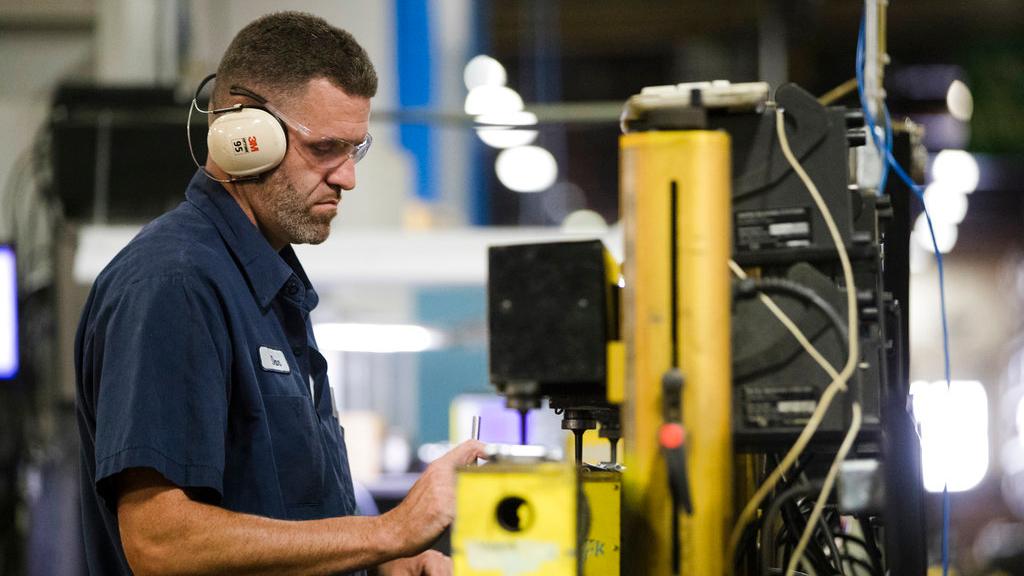US manufacturers blame trade wars for slip in record-level optimism
Optimism among U.S. manufacturers slipped in the second quarter of 2019 from last year's record highs, according to the industry’s top trade group, as trade tensions with China and Mexico dampen economic forecasts.
Nearly 80 percent of firms have a positive outlook for their operations, according to the National Association of Manufacturer’s quarterly survey, down from nearly 90 percent in the first quarter.
Optimism peaked at 93 percent last year, a record in the survey's 20-year history as the GOP-led tax cuts fueled a bustling economy.
“Clearly, optimism is still strong among manufacturers, but you can’t overlook the fact that trade uncertainties are causing concern for manufacturers,” said NAM Chief Economist Chad Moutray, who conducted the survey.
Key to improving the outlook, Moutray said, is approving USMCA, completing a trade deal with China and President Trump removing his threat to impose tariffs on auto imports to the U.S.
Driving much of the concern is the ongoing trade discussions with China, as well as the uncertain future of a new trade deal with Canada and Mexico. Among the 689 respondents to the survey, 56 percent said they were concerned about trade, while 50 percent listed rising raw material prices as a worry.
Mexico on Wednesday ratified the United States–Mexico–Canada Agreement (USMCA), but it remains unclear when House Speaker Nancy Pelosi, D-Calif., plans to bring the measure up for a vote. Democrats are concerned over the labor provisions and pharmaceutical protections in the deal meant to replace the North American Free Trade Agreement.
On the China front, Trump and President Xi Jinping will meet at the upcoming G20 summit in Japan. Top U.S. and China trade officials are expected to restart trade negotiations prior to that gathering.
The White House, however, is still eying tariffs on an additional $300 billion in shipments from Beijing, a move that corporate America is warning could lead to higher prices for consumers.
Companies flocked to Washington D.C. this week to push back against the new duties, telling the administration that it will be difficult to source many goods outside of China and warning that shifting production back to the U.S. is unlikely to produce many new jobs.
| Ticker | Security | Last | Change | Change % |
|---|---|---|---|---|
| I:DJI | DOW JONES AVERAGES | 50135.87 | +20.20 | +0.04% |
| SP500 | S&P 500 | 6964.82 | +32.52 | +0.47% |
| I:COMP | NASDAQ COMPOSITE INDEX | 23238.66991 | +207.46 | +0.90% |
While economists have largely downplayed the threat of an economic recession, U.S. firms are warning that a slowdown is approaching.
The economy added 75,000 jobs in May, much smaller than experts expected. And manufacturing jobs, which had been a source of significant growth in recent years, slowed to an increase of 3,000 positions last month.
The Federal Reserve is strongly hinting that it will cut interest rates this year, a move that is likely to spur renewed growth.
The unemployment rate, however, still remains at a decades low, making it more difficult for companies to find qualified workers. Nearly 69 percent of manufacturers listed finding and retaining the necessary workforce as a key concern, according to the survey from the National Association of Manufacturers.
Respondents expect wages to 2.3 percent over the next 12 months. Overall, prices are estimated to rise 2 percent, while increases in raw material costs slow to 3.1 percent.
Sales growth is expected to decrease to 3.4 percent in the next year, down from the prior 4.4 percent outlook. Meanwhile, insurance costs are expected to grow by 6.5 percent.
CLICK HERE TO GET THE FOX BUSINESS APP
Health care is one of the top issues on the 2020 campaign trail, as Democrats increasingly call for a government-financed system, often referred to as “Medicare for All,” while the Trump administration continues to try to repeal and replace Obamacare.




















